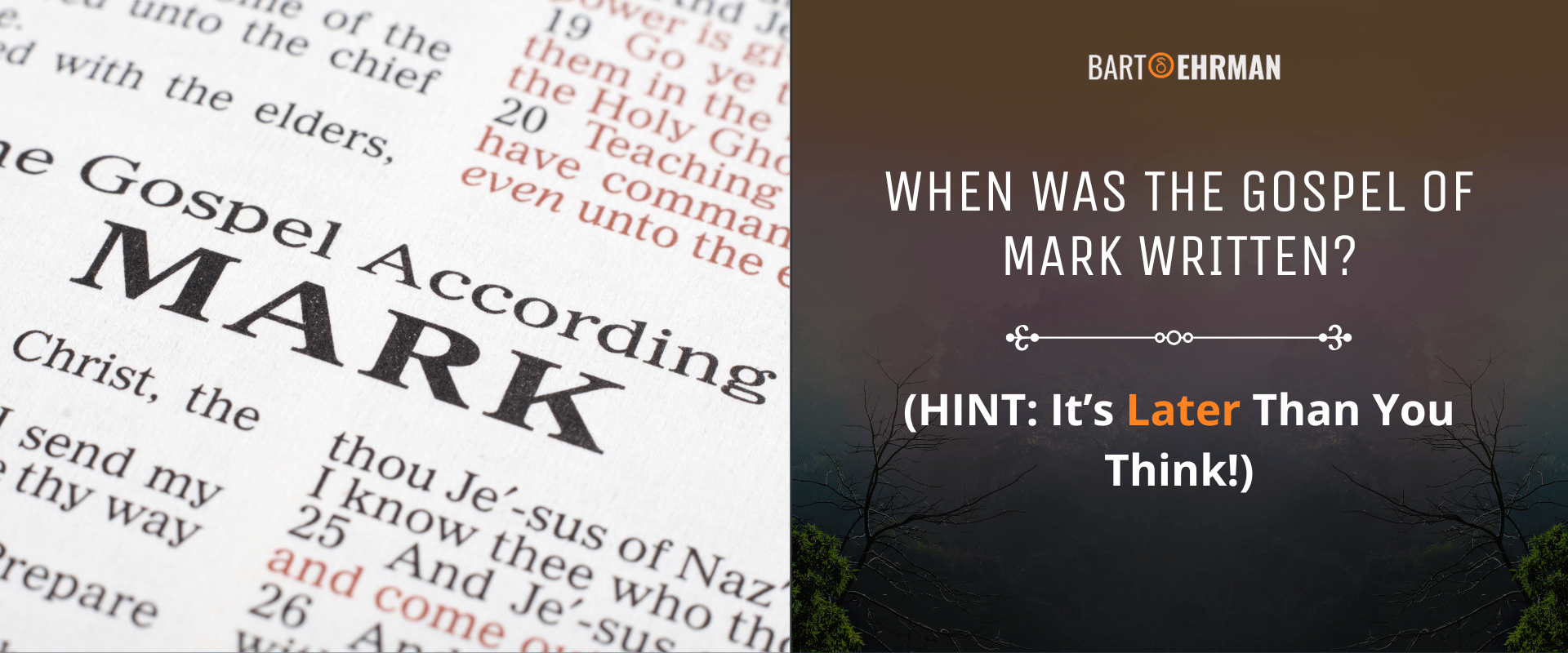When Was the Gospel of Mark Written? (HINT: It’s Later Than You Think!)

Written by Joshua Schachterle, Ph.D
Author | Professor | Scholar
Author | Professor | BE Contributor
Verified! See our editorial guidelines
Verified! See our guidelines
Date written: July 10th, 2024
Disclaimer: The views and opinions expressed in this article belong to the author and do not necessarily match my own. - Dr. Bart D. Ehrman
The Gospel of Mark is a landmark in Christian literature, pivotal not only for its narrative influence but for its enigmatic origins. Rooted in a complex interplay of tradition, textual analysis, and historical context, the quest to uncover the gospel's dating continues to fascinate and challenge scholars.
While many assume the Gospels were written right after Jesus’ death, their composition happened much later than you might think. When was the Gospel of Mark written? In this article, I’ll answer that question, who wrote it, and how we can know.

Who Wrote the Gospel of Mark?
Before investigating when the Gospel of Mark was written, let’s look into who wrote it. An early Christian tradition cited by 4th-century church historian Eusebius says a bishop named Papias (60 CE-130 CE) claimed the Gospel was written by someone named Mark, an interpreter and secretary for the apostle Peter. It was long believed that this was John Mark, a minor biblical figure mentioned in the book of Acts as a companion of Paul’s
However, there are problems with Papias’ testimony. For example, he claims the information he received about Mark came from the companions of the elders who were followers of the apostles. At best, then, this testimony comes from fourth-hand oral traditions passed down and, therefore, likely distorted for years.
For this reason and others, in The Historical Figure of Jesus, E.P. Sanders wrote that the scholarly consensus says the book was written anonymously. (Affiliate Disclaimer: We may earn commissions on products you purchase through this page at no additional cost to you. Thank you for supporting our site!) In fact, all the oldest manuscripts of Mark have no title or author’s name. The name Mark was probably added much later by scribes to certify the book’s authority.
Because Mark was written anonymously, we must rely on clues within the text to understand who the author was. He wrote in Greek, indicating he was likely not a native of Palestine, where Aramaic was the principal language. Many scholars point to Rome as the book’s likely place of composition. In addition, the author’s frequent misunderstandings of Jewish traditions mean he was probably not Jewish, although there is some scholarly disagreement on this point.
Which Gospel was written first? Before dating the Gospel of Mark accurately, it’s important to know that the vast majority of scholars agree it was the first canonical Gospel written.
If you read Mark alongside copies of Matthew and Luke, it becomes obvious that many of the same stories — and sometimes even the exact words — are used in all three (see the table below).
Matthew 3:16-17 | Mark 1:10-11 | Luke 3:21-22 |
|---|---|---|
16 And when Jesus had been baptized, just as he came up from the water, suddenly the heavens were opened to him and he saw God’s Spirit descending like a dove and alighting on him. 17 And a voice from the heavens said, “This is my Son, the Beloved, with whom I am well pleased.” | 10 And just as he was coming up out of the water, he saw the heavens torn apart and the Spirit descending like a dove upon him. 11 And a voice came from the heavens, “You are my Son, the Beloved; with you I am well pleased.” | 21 Now when all the people were baptized and when Jesus also had been baptized and was praying, the heaven was opened, 22 and the Holy Spirit descended upon him in bodily form like a dove. And a voice came from heaven, “You are my Son, the Beloved; with you I am well pleased.” |
Scholars now know that Mark was written first and that both Matthew and Luke used Mark as a source. Scholar Brent Nongbri notes that Matthew and Luke contain about 90% of Mark. John may or may not have known the book of Mark, and scholars are still divided on this issue.
But if Mark was written first, what were its sources? In Mark: A Commentary, Eugene Boring writes that Mark’s sources were probably oral and included a passion narrative, apocalyptic discourse, collections of sayings, miracle stories, and parables.
So, we now know that Mark was our oldest Gospel, that Matthew and Luke were written next using Mark’s story, and that John was written last. Does that mean we know when the author of Mark was writing and if so, how?
TEST YOUR KNOWLEDGE of the Historical Jesus!
Think you know the Jesus of the Bible? Uncover the historical figure behind the texts!
It's free!
When Was the Gospel of Mark Written?
One way to speculate about this question is to start from what we know, eliminating the dates of composition that are impossible. For instance, Jesus died around the year 30 CE. We can, therefore, reliably say that the Gospel of Mark was written after that since the book ends with Jesus’ death and burial.
Another point many scholars make when examining possible composition dates is that Paul, writing mostly in the 50s CE, never mentions anything about Mark or any other written Gospel. This is significant since Paul was so well-traveled and would certainly have known of a written biography of Jesus’ life had it existed. Therefore, Mark must have been written later than the 50s CE.
Probably the best clue to when Mark was written can be found in the writing itself, specifically in Mark 13:1-2:
As he came out of the temple, one of his disciples said to him, “Look, Teacher, what large stones and what large buildings!” Then Jesus asked him, “Do you see these great buildings? Not one stone will be left here upon another; all will be thrown down.”
In this scene, Jesus and the disciples have come to Jerusalem for Passover. The disciples have clearly never been there, as they are entirely amazed by the temple’s majestic appearance. However, Jesus is unimpressed, telling them the temple will be destroyed. This destruction actually happened, and historians know when: 70 CE.
Mark 13 is often called the Little Apocalypse, as it details a terrifying end which Jesus says is necessary for the kingdom of God to come. In fact, he seems to be foretelling the First Roman-Jewish War which took place from 66 CE-74 CE. This was a massive Jewish revolt against Rome in which, ultimately, the city of Jerusalem and its temple were burned to the ground.
Did Jesus really predict this? In terms of dating the composition of Mark, it actually doesn’t matter. Bart Ehrman asks, for example, when an early Christian author would have written about this destruction. The obvious answer is after it had already occurred, to show that Jesus’ prediction had been accurate. So whether Mark invented Jesus’ prediction or not, he must have been writing after the actual destruction of the temple in 70 CE. Now, we are closing in on a probable date.
But couldn’t Mark have been written much later than 70 CE? Ehrman points out that early Christian authors Ignatius of Antioch (died 108 CE) and Polycarp of Smyrna (69 CE-155 CE) both seem to know and cite material from some (unspecified) Gospels. This means that the earliest Gospels were written and being read before 110 CE, which gives us a good range to work with.
In the Jewish Annotated New Testament, Lawrence Wills writes that, in his opinion, Mark was probably written sometime during the Roman-Jewish War, although the author was certainly not living in Jerusalem. Wills believes this because of Mark’s emphasis on the destruction of the temple, as well as vivid descriptions of refugees fleeing from Jerusalem.
Those in Judea must flee to the mountains; the one on the housetop must not go down or enter to take anything from the house; the one in the field must not turn back to get a coat. Woe to those who are pregnant and to those who are nursing infants in those days! Pray that it may not be in winter. For in those days there will be suffering, such as has not been from the beginning of the creation that God created until now and never will be.
All of this information ultimately points to a date somewhere between 70 CE (when the temple was destroyed) and 74 CE (when the war ended). While it’s still our oldest Gospel, it was written at least 40 years after Jesus’ death.

Conclusion
The Gospel of Mark is our oldest Gospel. Scholars agree it was originally written anonymously by a Greek-speaking gentile living outside Palestine, perhaps in Rome.
When was the Gospel of Mark written? It can be reliably dated after the 50s CE since Paul was writing during that time and never mentioned any written Gospels. In addition, the Little Apocalypse in Mark 13 focuses on the Roman-Jewish War of 66-74 CE, in which not only the temple, but most of Jerusalem was destroyed. The Gospel even seems to describe the fleeing of refugees from Jerusalem, making it seem as if Mark might have been writing during or just after the war. He would probably not have written of this war and destruction had it not already happened.
Finally, early Christian authors such as Ignatius of Antioch seem to know some early Gospels, and since Ignatius died in 108 CE, Mark must have been written well before that. For all these reasons, the Gospel of Mark was likely written between 70 CE — when the temple was destroyed — and 74 CE — when the war ended.

